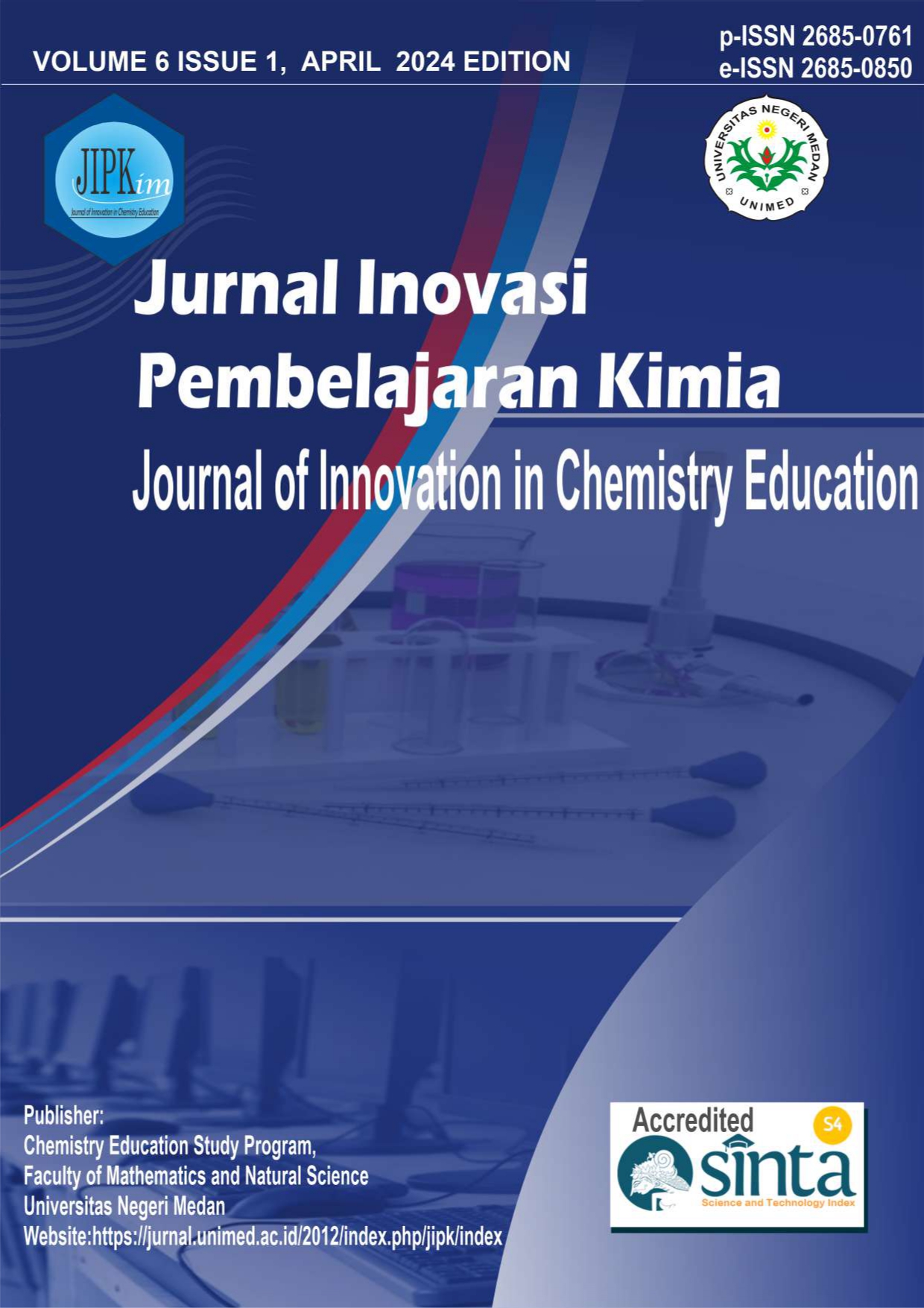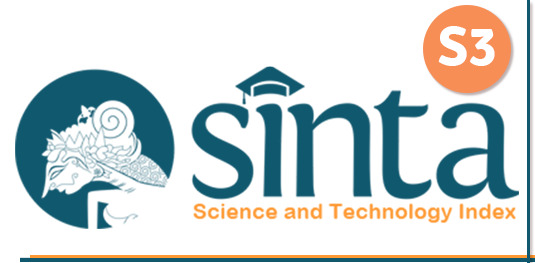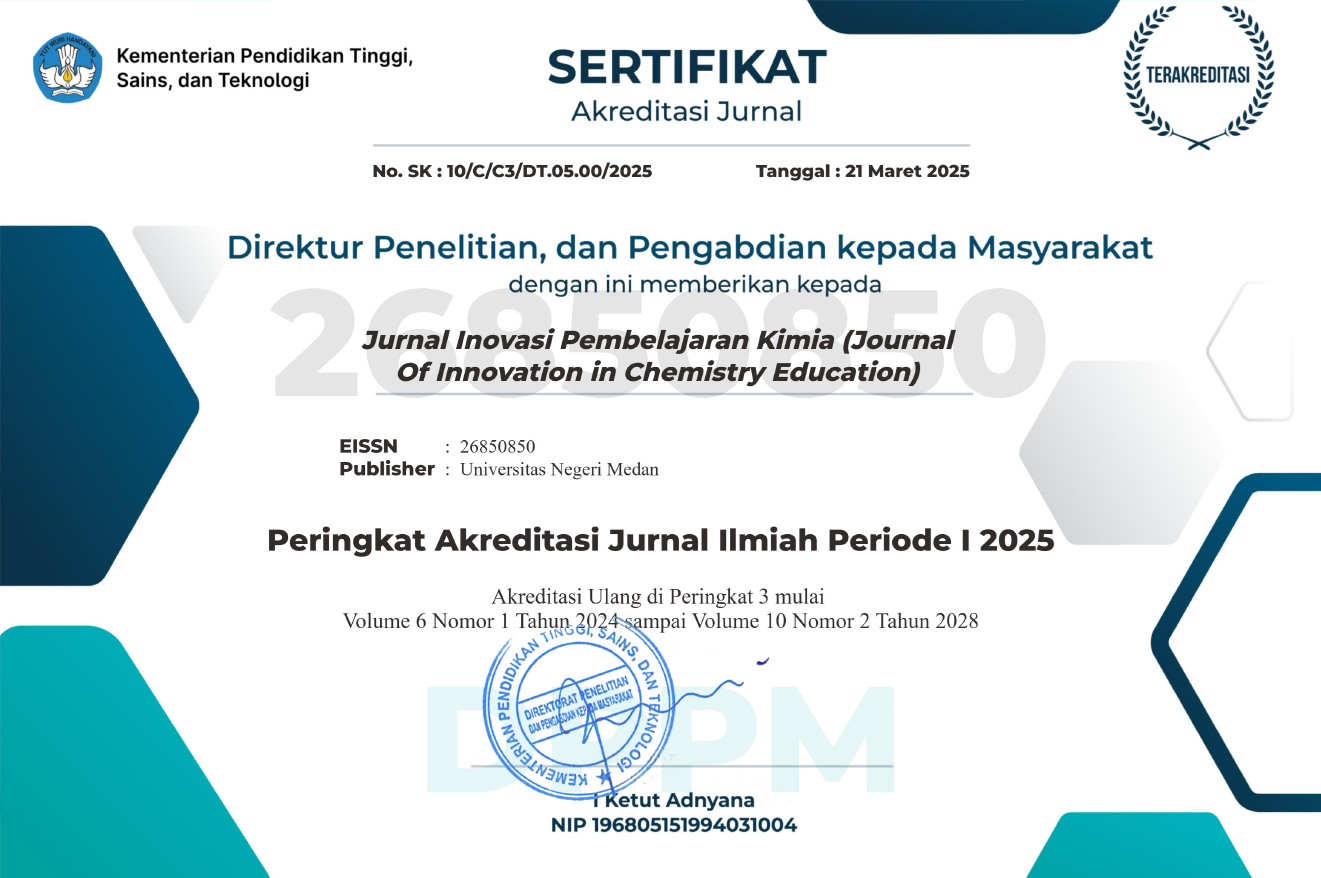The Influence of Problem Based Learning Weblog on Students Motivation and Learning Outcomes on Thermochemical
DOI:
https://doi.org/10.24114/jipk.v6i1.57248Keywords:
Problem Based Learning, Weblog, ThermochemicalAbstract
This research aims to determine the influence of weblog media using the problem-based learning model on student motivation and learning outcomes on thermochemical material. This research was conducted at SMAN 1 Percut Sei Tuan in the 2023/2024 academic year. Sample determination was carried out using a purposive sampling technique. The sample consisted of 2 classes, namely class XI-Matlanko 2 as an experimental class (30 students) which was taught using Weblog media and class The instruments used are test instruments to measure learning outcomes and non-test instruments to measure learning motivation. The results of this research indicate that there is an influence of using a weblog using a problem-based learning model on student learning motivation by testing the sig hypothesis. 0.00 < α (0.05) and there is also an influence of using a weblog using the problem-based learning model on student learning motivation with hypothesis testing sig. 0.00 < α (0.05). Apart from that, there is a correlation between learning motivation and student learning outcomes who are taught using weblog media using the problem-based learning model with sig. 0.00 < α (0.05) and Pearson correlation 0.953 with the high category.References
Antara, I. P. P. A. (2022). Model Pembelajaran Problem Based Learning Untuk Meningkatkan Hasil Belajar Kimia Pada Pokok Bahasan Termokimia. Journal of Education Action Research, 6(1), 15-21. https://doi.org/10.23887/jear.v6i1.44292
Ardianti, R., Sujarwanto, E., & Surahman, E. (2021). Problem-based Learning : Apa dan Bagaimana. Journal for Physics Education and Applied Physics, 3(1), 27“35.
Cholilah, M., Tatuwo, A. G. P., Komariah, & Rosdiana, S. P. (2023). Pengembangan Kurikulum Merdeka Dalam Satuan Pendidikan Serta Implementasi Kurikulum Merdeka Pada Pembelajaran Abad 21. Sanskara Pendidikan Dan Pengajaran, 1(2), 56“67. https://doi.org/10.58812/spp.v1i02.110
Djarwo, C. F. (2020). Analisis Faktor Internal Dan Eksternal Terhadap Motivasi Belajar. Jurnal Ilmiah IKIP Mataram, 7(1), 2355“6358.
Fatah, A. H., Asi, N. B., Anggraeni, M. E., Wulandari, A., & Latif, A. (2021). Pengembangan Media Pembelajaran Kimia Dasar Berbasis Web Pada Pokok Bahasan Termokimia. Jurnal Ilmiah Kanderang Tingang, 12(1), 56“64.
Hijriyati, N., Muharini, R., Ulfah, M., Erlina, & Ira, L. (2022). Hubungan Kebiasaan Belajar dengan Hasil Belajar Siswa Mata Pelajaran Kimia pada Masa Pandemi Covid-19. Jurnal Kependidikan Kimia, 10(2), 146“161. http://ojs.undikma.ac.id/index.php/hydrogen/
Kurnia, L. D., Haryati, S., & Linda, R. (2022). Pengembangan Instrumen Evaluasi Higher Order Thinking Skills Menggunakan Quizizz Pada Materi Termokimia untuk Meningkatkan Kemampuan Berpikir Tingkat Tinggi Peserta Didik. Jurnal Pendidikan Sains Indonesia, 10(1), 176“190. https://doi.org/10.24815/jpsi.v10i1.21727
Kurniawati, F. N. A. (2022). Meninjau Permasalahan Rendahnya Kualitas Pendidikan Di Indonesia Dan Solusi. Academy of Education Journal, 13(1), 1“13. https://doi.org/10.47200/aoej.v13i1.765
Lestari, D. D., & Muchlis, M. (2021). E-LKPD Berorientasi Contextual Teaching and Learning Untuk Melatihkan Keterampilan Berpikir Kritis Siswa Pada Materi Termokimia. Jurnal Pendidikan Kimia Indonesia, 5(1), 25“33. https://doi.org/10.23887/jpk.v5i1.30987
Marpaung, D. N., & Pongkendek, J. J. (2021). Modul Pembelajaran Kimia SMP Berbasis Scientific Approach Pada Materi Asam dan Basa Berdasarkan Kurikulum 2013. Jurnal Pendidikan Kimia Indonesia, 5(1), 44“50. https://ejournal.undiksha.ac.id/index.php/JPK/index
Mayasari, A., Arifudin, O., & Juliawati, E. (2022). Implementasi Model Problem Based Learning (Pbl) Dalam Meningkatkan Keaktifan Pembelajaran. Jurnal Tahsinia, 3(2), 167“175. https://doi.org/10.57171/jt.v3i2.335
Munthe, S. P., & Suyanti, R. D. (2024). The Impact of the PBL Models Helping iSpring Presenters on Student HOTS Literacy on Reaction Rate. Jurnal Inovasi Pembelajaran Kimia (Journal Of Innovation in Chemistry Education), 5(2), 148“154.
Pane, N. V., & Dibyantini, R. E. (2023). Development of student™s initial ability test based on generic science skills. Jurnal Inovasi Dan Teknologi Pembelajaran, 10(2), 190. https://doi.org/10.17977/um031v10i22023p190
Panggabean, F. T. M., Silitonga, P. M., Purba, J., Jasmidi, J., & Purba, R. A. (2023). Analysis Student Motivation and Learning Outcomes by Apllying Problem Based Learning and Discovery Learning Models. Jurnal Inovasi Pembelajaran Kimia (Journal Of Innovation in Chemistry Education), 5(1), 11“16. https://jurnal.unimed.ac.id/2012/index.php/jipk/article/view/42419%0Ahttps://jurnal.unimed.ac.id/2012/index.php/jipk/article/viewFile/42419/20831
Ramadhana, G. H., & Sutiani, A. (2023). Implementation of Problem Based Learning on Critical Thinking to Increase Learning Outcomes and Student Activities. Jurnal Inovasi Pembelajaran Kimia (Journal Of Innovation in Chemistry Education), 5(1), 37“43.
Rohmawati, E., Widodo, W., & Agustini, R. (2018). Membangun Kemampuan Literasi Sains Siswa Melalui Pembelajaran Berkonteks Socio-Scientific Issues Berbantuan Media Weblog. Jurnal Penelitian Pendidikan IPA, 3(1), 8-14. https://doi.org/10.26740/jppipa.v3n1.p8-14
Rombe, Y. P., Murtihapsari, M., Alberta, F., Yogaswara, R., & Surbakti, P. S. (2021). Pembelajaran Berbasis Masalah (Problem Based Learning) Secara Online Selama Pandemi Covid-19. Jurnal Pendidikan Kimia Undiksha, 5(2), 67-74. https://doi.org/10.23887/jjpk.v5i2.38402
Septhiani, S., & Nusantari, D. O. (2020). Pemanfaatan Blog sebagai Alternatif Media Pembelajaran Kimia. Prosiding Seminar Nasional Dan Diskusi Panel Pendidikan Matematika Universitas Indraprasta PGRI Jakarta, 2, 6.
Siagian, D. P., & Yasthophi, A. (2021). Desain dan Uji Coba Media Pembelajaran Berorientasi Everyday Life Phenomena pada Materi Termokimia. JRPK: Jurnal Riset Pendidikan Kimia, 11(2), 64“73. https://doi.org/10.21009/jrpk.112.02
Somayana, W. (2020). Peningkatan Hasil Belajar Siswa melalui Metode PAKEM. Jurnal Pendidikan Indonesia, 1(3), 350“361. https://doi.org/10.36418/japendi.v1i3.33
Suhandi, A. M., & Robi™ah, F. (2022). Guru dan Tantangan Kurikulum Baru: Analisis Peran Guru dalam Kebijakan Kurikulum Baru. Jurnal Basicedu, 6(4), 5936“5945. https://doi.org/10.31004/basicedu.v6i4.3172
Tambunan, C. E., Simanjuntak, N. Z., & Susanti, N. (2021). Pengembangan Website Berbasis Problem Based Learning Sebagai Media Pembelajaran Online Pada Materi Laju Reaksi. Jurnal Inovasi Pembelajaran Kimia (Journal Of Innovation in Chemistry Education, 3(1), 34“45. https://jurnal.unimed.ac.id/2012/index.php/jipk
Vhalery, R., Setyastanto, A. M., & Leksono, A. W. (2022). Kurikulum Merdeka Belajar Kampus Merdeka: Sebuah Kajian Literatur. Research and Development Journal of Education, 8(1), 185-201. https://doi.org/10.30998/rdje.v8i1.11718













